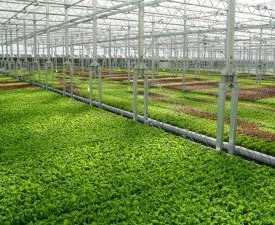Description
Course Name: Certificate in Green House Technology
Course Id: CGHT/Q1001.
Eligibility: A higher secondary (12th grade) or equivalent is required.
Duration: Three Months.
Objective: The primary objective of the Certificate in Green House Technology course is to equip students, farmers, and agricultural professionals with practical knowledge and technical skills required to plan, construct, and manage greenhouse structures for sustainable and profitable cultivation. The course aims to promote advanced agricultural practices for enhanced crop production in controlled environments.






Debit/Credit Card, Wallet, Paytm, Net Banking, UPI, or Google Pay.



• A soft copy (scanned) of your certificate via email within 7 days of examination.
• A hard copy (original with official seal and signature) sent to your address within 45 day of declaration of result.

Online Examination Detail:
Duration- 60 minutes.
No. of Questions- 30. (Multiple Choice Questions).
Maximum Marks- 100, Passing Marks- 40%.
There is no negative marking in this module.
| Marking System: | ||||||
| S.No. | No. of Questions | Marks Each Question | Total Marks | |||
| 1 | 10 | 5 | 50 | |||
| 2 | 5 | 4 | 20 | |||
| 3 | 5 | 3 | 15 | |||
| 4 | 5 | 2 | 10 | |||
| 5 | 5 | 1 | 5 | |||
| 30 | 100 | |||||
| How Students will be Graded: | ||||||
| S.No. | Marks | Grade | ||||
| 1 | 91-100 | O (Outstanding) | ||||
| 2 | 81-90 | A+ (Excellent) | ||||
| 3 | 71-80 | A (Very Good) | ||||
| 4 | 61-70 | B (Good) | ||||
| 5 | 51-60 | C (Average) | ||||
| 6 | 40-50 | P (Pass) | ||||
| 7 | 0-40 | F (Fail) | ||||







Syllabus:
Introduction to Greenhouse Technology: Definition and importance of greenhouse technology, History and evolution of greenhouses, Types of greenhouses and their structures, Components of a greenhouse, Selection of site for greenhouse establishment, Climate control in greenhouses, Economic benefits of greenhouse farming, Challenges in greenhouse cultivation, Sustainable and eco-friendly greenhouse practices, Career opportunities in greenhouse technology.
Greenhouse Structures and Materials: Types of greenhouse structures (glasshouse, polyhouse, shade net), Materials used for greenhouse construction, Design considerations for different climatic conditions, Ventilation systems and air circulation, Heating and cooling systems, Waterproofing and insulation techniques, Energy-efficient greenhouse designs, Maintenance and repair of greenhouse structures, Role of sensors and automation in greenhouses, Cost estimation for greenhouse setup.
Environmental Control and Monitoring: Temperature control and its impact on crops, Humidity management in greenhouses, Carbon dioxide enrichment techniques, Light intensity and photoperiod control, Role of shading and light diffusion, Ventilation systems (natural and mechanical), Soil vs. soilless culture in greenhouses, Water quality and irrigation management, Role of automation in environmental control, Weather stations and climate sensors
Greenhouse Crop Selection and Cultivation: Criteria for selecting crops for greenhouse farming, Cultivation techniques for vegetables, flowers, and fruits, High-yield and disease-resistant crop varieties, Hydroponics and aeroponics in greenhouse farming, Vertical farming and space utilization, Organic farming practices in greenhouses, Growth stages and nutrient requirements of crops, Harvesting and post-harvest handling, Crop rotation and soil fertility management, Common mistakes in greenhouse crop production.
Irrigation and Water Management: Types of irrigation systems in greenhouses, Drip irrigation and its advantages, Fogging and misting systems, Water conservation techniques, Rainwater harvesting for greenhouse farming, Role of fertigation in crop nutrition, Water quality testing and treatment, Common irrigation-related issues and solutions, Automation in irrigation systems, Efficient drainage and water recycling methods.
Pest and Disease Management: Common pests affecting greenhouse crops, Biological pest control methods, Use of integrated pest management (IPM), Chemical control measures and safety precautions, Disease diagnosis and control strategies, Role of beneficial insects in pest control, Common fungal and bacterial diseases, Sanitation and hygiene practices, Impact of climate on pest and disease outbreaks, Use of resistant plant varieties.
✅ Career Opportunities After Certificate in Green House Technology
The Certificate in Green House Technology equips students with specialized skills in protected cultivation, climate-controlled farming, and modern horticultural practices. With India’s growing focus on agri-tech and sustainable farming, certified individuals can explore various roles across sectors.
🌿 Top Career Roles and Salary Range
| Job Role | Description | Salary Range (INR per annum) |
|---|---|---|
| Greenhouse Technician | Maintains and monitors greenhouse environment, irrigation, and crop health. | ₹1.8 – ₹3.5 lakhs |
| Horticulture Assistant | Assists in plant care, pest control, and greenhouse management. | ₹1.5 – ₹3 lakhs |
| Protected Cultivation Supervisor | Supervises cultivation under polyhouse/net house settings. | ₹2 – ₹4.2 lakhs |
| Climate & Irrigation Control Operator | Operates automated systems for temperature, humidity, and irrigation. | ₹2 – ₹4 lakhs |
| Greenhouse Crop Production Specialist | Focuses on high-yield, high-quality crop production techniques. | ₹3 – ₹5.5 lakhs |
| Agricultural Entrepreneur | Starts own greenhouse farming business (vegetables, herbs, flowers, etc.) | ₹5 – ₹15+ lakhs (profit-based) |
| Agri-Tech Field Officer | Works with agri-input firms or tech startups to support greenhouse farmers. | ₹2.5 – ₹5 lakhs |
| Research Assistant in Horticulture | Supports crop and environment research in greenhouses. | ₹2.8 – ₹6 lakhs |
| Greenhouse Consultant | Provides advice on greenhouse setup, operations, and ROI optimization. | ₹3.5 – ₹7 lakhs |
| Government Agricultural Technician | Works on state/national greenhouse farming projects. | ₹2.2 – ₹4.5 lakhs |
📌 Industries and Employers
-
Commercial Greenhouse Farms
-
Agri-Tech Startups (e.g., hydroponics, vertical farming)
-
Horticulture and Floriculture Units
-
State Horticulture Departments
-
Krishi Vigyan Kendras (KVKs)
-
NGOs and Agri-based Rural Development Projects
-
Export Houses for Exotic Fruits/Vegetables
-
Agro-Tourism Ventures
🚀 Growth Scope
With practical experience and advanced training, professionals can become:
-
Greenhouse Managers
-
Project Coordinators
-
Agri-Consultants
-
Export Farming Specialists

